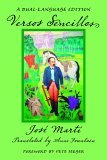
An excerpt from Anne Fountain's "Versos Sencillos: A Dual-Language
Edition" © 2005
by permission of McFarland & Company, Inc., Box
611, Jefferson NC 28640
"Guantanamera" and Versos Sensillos

The case of "Guantanamera," a song sung around the globe, presents some special questions in regard to the diffusion of Martí's verses thourgh translation. Because there are varied renditions of the verses sung to what is frequently called "Guajira Guantanamera" (the guajira is a type of Cuban song), and because different singers may make a personal selection of the verses to include, it is difficult to say that there is a definitive non-copyrighted version of the words and music. A contemporary interpretation in Spanish, for example, features a woman singing, "Soy una mujer sincera" (I am a sincere woman)-quite distinct from Marti's "Soy un hombre sincero" (I am a sincere man).
Many-perhaps most-of those hearing this music are unaware of the multiple manifestations of the song and of the song and of the origin and personal history of the poetry and while some of the "Guantanamera" translations convey Marti's message adequately, others are completely misleading and misinterpret the lines in various ways. Thus it is fair to say that as part of their diffusion, Marti's verses have suffered distortion. Translations of Martí's poetry as rendered through "Guantanamera" or under the heading "Guajira Guantanamera" may appear on song sheets, as part of a classroom exercise, or in print versions with a wide distribution.* Some Internet sites further the confusion with faulty transcription of the poetry and misleading information about Martí, transmitting the errors to an ever-widening public.
The initiator of the idea to combine Martí's verses with a popular Cuban melody was a talented Cuban musician named Julián Orbón, who in the 1940s as a member of the group of artists and intellectuals known as "Orígenes," met for tertulias in a house on Calle Calzada between Tenth Street and Twelfth Street not far from what is today the Center for Martí Studies in Havana. Later, one of Orbón's students, Hector Angulo, introduced the song to pete Seeger, at a summer camp in the Catskills. A complete recounting of the events is given in Seeger's Where Have All the Flowers Gone, published in 1993. While Seeger is modest about his role, he was, in fact, the catalyst for Marti's fame through song around the world.
*For example, a booklet accompanying a Smithsonian Folkways compact disc called Cuba in Washington gives a version of the Martí lines from XXXIX (I cultivate a white rose, "which conveys the words "cardo" (thistle) and "oruga" (an herb of the mustard family) as "broths and salads." The lines read, "Neither broths nor salads do I tend/I tend a white rose," and the apparent reason for the peculiar version is a mistranscription of the original. The original lines in Spanish are "Cardo ni oruga cultivo / cultivo una rosa blanca," but the CD notes misquote the first line as "Caldos [broths] ni oruga cultivo," producing an odd and erroneous "translation."
José Martí portal | Martí/Apostle | Timeline | Books | photos
Letters and Articles by José Martí
Our America |
Montecristi Manifesto (full text) |
Last letter to his mother | Incomplete
letter to his friend Manuel Mercado |
On
Antonio
Maceo | Letter to Maximo Gomez,
1884 (in which he resigns from the revolutionary movement) |
My Race (from patria)
Related:
Antonio Maceo | War for Independence